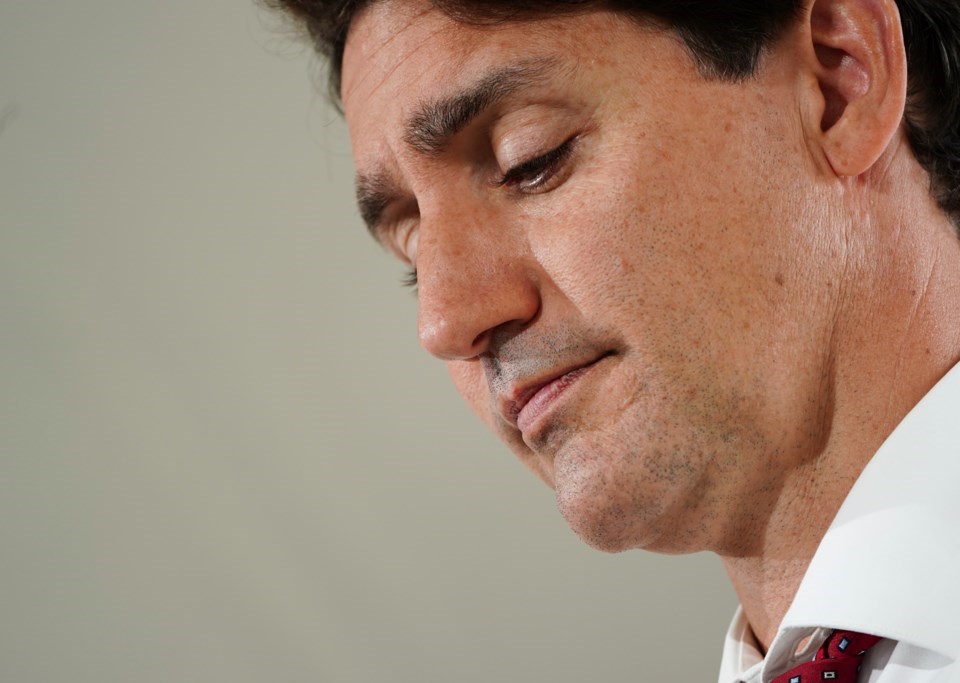Justin Trudeau’s father, in dealing in 1970 with an apprehended terrorist threat to the safety of Québec and possibly the wider nation, invoked the draconian War Measures Act after telling a reporter: “Just watch me.”
Justin Trudeau himself, in dealing a half-century later with trucking convoy occupations that pose no terrorist threat but a tenacious logistical one in Ottawa that police and provinces have used their powers to dismantle elsewhere in Canada, invoked the act’s modern-day equivalent.
Just watch him.
Watch him very, very carefully.
This is a test he will be remembered for, not for any success but only if it fails, because there were other paths to success he did not select.
The use of the blunt instrument of the federal Emergencies Act is of questionable value and relevance. There are no letter boxes exploding, no diplomat kidnapped, no minister assassinated, no imminent negotiations to send the convoy’s leaders to Cuba, or even to Mar-a-Lago. There is also a Charter of Rights and Freedoms, case law to refine the intentions, and heightened public profile of politics through the ample media megaphone. The context and conditions are a mismatch to the proposed solution.
Beyond the delusionary view among some convoy organizers that the sitting government should step aside for them – and, of course, the hostility that the convoy provides and engenders in communities – this is not from the inside what America is perceiving from the outside as the collapse of Canada.
In thousands of communities today, we are peacefully coexisting despite disagreements on the coronavirus strategy. In a handful, there are protests that have gone over the line and are being dealt with in a dignified way generally and a more substantive one if necessary.
This appeared to be happening in Windsor at the Ambassador Bridge, Coutts at the Alberta border crossing, and at the Peace Arch crossing in our province. In these cases the enlistment of national police appears to have undone the doings.
It’s the Ottawa problem we are all paying for because Ottawa had no plan. (How many times on how many subjects have we said that before?)
The move Monday was further evidence that the prime minister is out of patience and prepared to ostracize his opponents. Only this time is exactly the wrong time. This isn’t 2020 or 2021 when the virus had the upper hand and our fears were more genuine. This is the long tail, the hit-the-wall part of the run, the three-minute hockey shift, the frontline worker double-shift. This is a fatigue-ridden time to politically walk professionally and delicately toward anger. Instead, Trudeau’s depiction of those who will not play by his rules made even comedian host Bill Maher cringe in recent days.
Today we are relenting as a country in the restrictions we imposed on personal freedoms for very good reason. Provinces, including our own Tuesday, are accommodating the endemic phase of the coronavirus and accepting to a greater degree each day that we have maxxed out the vaxxing and now just need to live with COVID’s flickering flame.
Instead, the prime minister has chosen to double down.
The emergencies law is quite the card to play – indeed, quite the statement about his perception of the country and how he wishes to govern it. Correctly criticized for inaction at the start of the convoy, Trudeau over-compensated with the largest legal weapon he has. It has the power to temporarily abrogate basic Canadian rights – something we have defined – in order to restore public order – something we would find hard to agreeably define.
Some civic blundering a couple of weeks back as the convoy came to the capital permitted an occupation that it didn’t take a genius to anticipate. Police might as well have parked the trucks for them and the local chamber of commerce thrown a barbecue. The police chief Tuesday paid the price with his job for his non-plan.
No question, some of the occupying truckers and their families and friends have hardly been model citizens. Some harbour perspectives that don’t need amplification here. But does everyone deserve the harsh treatment that comes with the law that lay idle since inception, a replacement for the act that did so much to enrage in 1970?
It is difficult to believe that conferred federal authority far short of the act couldn’t have towed the trucks and taken the licences from those who would not leave the capital, just as they cleared the paths elsewhere.
Our economy has been stifled many times by protest, even by occupation. Our prime minister has elected to make this his “just watch me” moment, even though he insists fundamental rights of assembly and speech and even protest will not be suspended.
We will see.
If Parliament indeed grants the government formal permission of the measures, they need to be lifted as quickly as they have been imposed. This is not a proud period and it needs to be brief.
Kirk LaPointe is publisher and editor-in-chief of Business in Â鶹´«Ã½Ó³»and vice-president, editorial, of Glacier Media.



